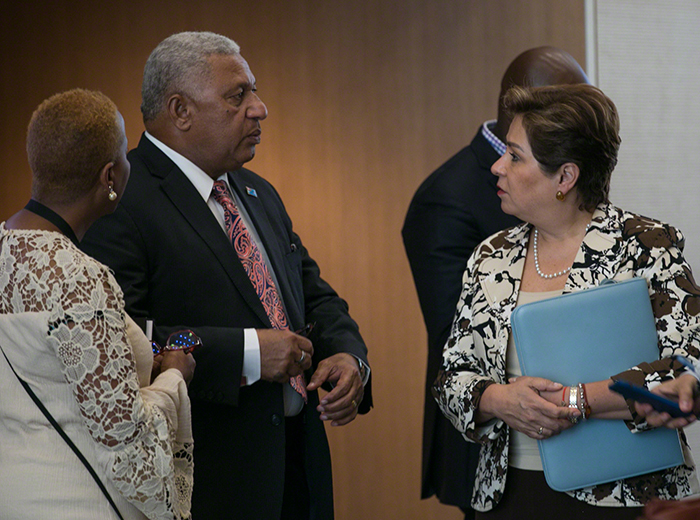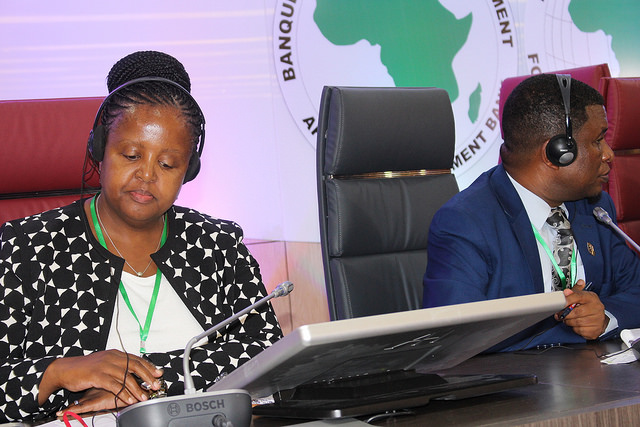
PAMACC News
Executive Secretary of the United Nations Framework Convention on Climate Change (UNFCCC), Patricia Espinosa is up-beat about the Talanoa Dialogue approach to climate negotiations.
At a round table with the media, Espinosa said the first phase of the Talanoa dialogue which took place on Sunday, 6th May, 2018, is a positive start towards an inclusive approach to climate negotiations and moving the process forward.
“The discussions about how to capture and derive from the Talanoa dialogue, general conclusions, is only starting now, it’s only a new process, it’s the first phase which happened yesterday, and delegations are starting now to think about what they would like to see as the outcome of the dialogue,” Espinosa said.
She said the secretariat would now wait on the compilation of a report whose content would form the basis for moving the process forward especially, the next round of NDCs depending on how each country decides to do their NDCs..
The UN climate chief further stated that the report would be crucial for the next phase of the dialogue which is likely to take place at COP 24—the political phase where a high level delegation of Presidents would have to make conclusions on the way forward.
However, Espinosa said, “the good news in my mind is that, the enthusiasm about raising ambition, and working together and uniting efforts is what has transpired from this very first phase of the Talanoa dialogue.”
The “Talanoa Dialogue” is a round-table non-confrontation approach to finding solutions to complicated challenges. It allows for stories and interventions covering three key thematic questions—where are we? where do we want to be? And how do we get there?
And adding to the Executive Secretary’s optimism, co-chairs also expressed a positive outlook of the progress made in the first week, during their stock-take.
They said work on the rulebook had progressed but needed to be significantly accelerated in the final week in order to be finalised at COP24.
While it is clear that today’s Talanoa Day is just kicking off a longer process, civil society expressed their hope that the Talanoa Dialogue will lead to all parties raising their climate ambition.
According to Climate action Network, the Talanoa Dialogue is a promising start towards inclusaive approach to climate action and must lay the groundwork for a real political outcome.
At a press conference, there was a feeling that the dialogue fostered a sense of good intentions in the room, making clear that vulnerability to climate change binds all actors together, highlighting the urgency of taking more ambitious action.
“This lack of climate action means we are ‘cheating one another and abandoning our children’. People around the world are angry. They want to see more climate action, they want to see it happening faster. That is why they go out on the streets with banners and march. That is why they are taking governments and companies who fail to take action to court,” said Juan Pablo Osornio, Task Force Leader at Greenpeace.
He said the Talanoa Dialogue provide the space in which some of the anger can be channeled as the forum allows for open and honest conversations, where participants ask the hard questions with respect and without pointing fingers.
From the UNFCCC perspective, the Talanoa dialogue is an approach worth pushing forward, by encouraging regional dialogues. “We are looking at the possibility of climate week in Latin America, I am not sure whether we already have a date for Asia, and the Middle East. We have not yet planned, but there are conversations going on to have one of these climate conversations in the Middle East,” said the UN Chief.
One other issue that is of importance to developing country parties especially Africa is Agriculture. And in response to African civil society concerns regarding the alleged push for industrial agriculture being pushed by developed countries, Espinosa said the secretariat was not keen on repeating the past mistakes that had brought the world to this state.
“I have been hearing very encouraging reports from the sessions, and I am positive that the discussions are heading in the right direction,” she said.
“I think the emphasis is climate smart and sustainable agriculture to support small farmers particularly to the realities of Africa. We are not talking about repeating the experiences from what has happened in the past, but avoid them, so I think we are heading in the right direction.”
The UN chief is equally positive about the finalization of the Paris rulebook, and the commitment of developed countries to providing finance to developing parties for their climate actions. “I am positive about the progress so far but there are discussions of whether we will have an additional session in Bankok,” she said.
In summary, Espinosa indicated that so far, the negotiations were on track and hopeful that they would serve the purpose of preparing for COP 24 slated for Poland later in December.










